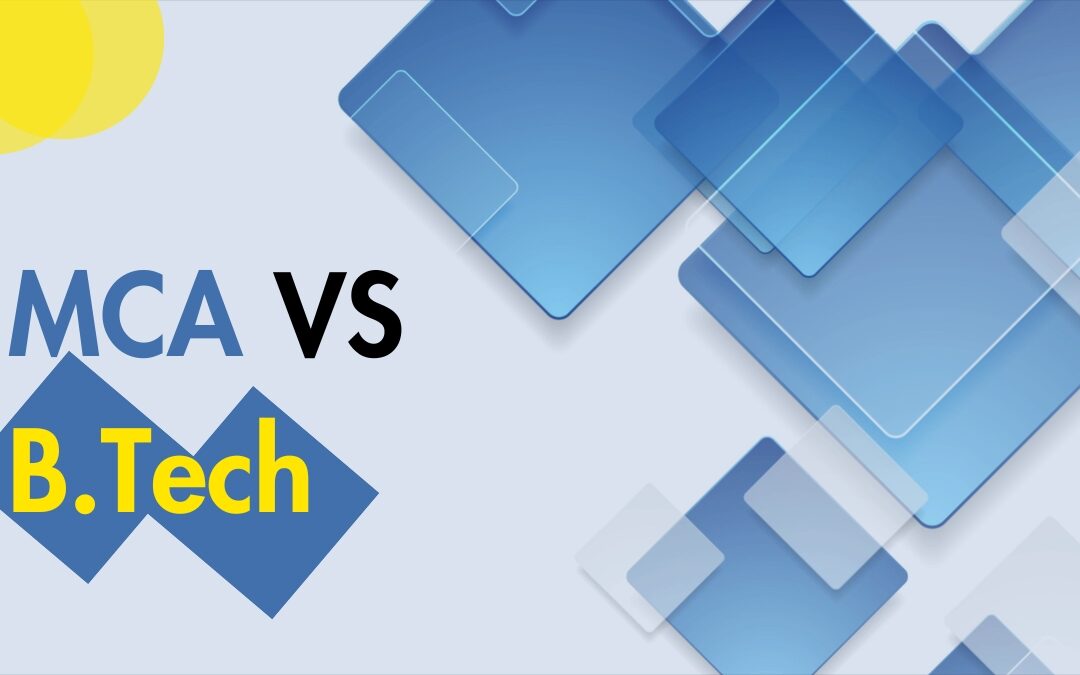When choosing a career path in the ever-evolving field of technology, many students find themselves at a crossroads: Should they pursue a Master of Computer Applications (MCA) or a Bachelor of Technology in Computer Science and Engineering (B.Tech CSE)? Both degrees have their unique advantages and can lead to rewarding careers, but they cater to different educational needs and career goals. In this blog post, we will delve into the differences, benefits, and potential career outcomes of MCA and B.Tech CSE to help you make an informed decision.
Understanding MCA and B.Tech CSE
MCA (Master of Computer Applications) is a postgraduate degree focusing on computer applications and software development. It is designed for students who have completed their undergraduate studies and wish to gain in-depth knowledge in computer applications. The MCA program usually spans three years and covers subjects such as programming, database management, software engineering, web development, and more.
B.Tech CSE (Bachelor of Technology in Computer Science and Engineering) is an undergraduate degree that provides a comprehensive foundation in computer science and engineering principles. The program typically lasts four years and includes coursework in programming, algorithms, computer architecture, networks, artificial intelligence, and more.
Key Differences Between MCA and B.Tech CSE
1. Educational Background:
- MCA: Requires a bachelor’s degree in any discipline, preferably with a background in mathematics or computer science.
- B.Tech CSE: Requires completion of higher secondary education (10+2) with a focus on science subjects, including mathematics and physics.
2. Duration:
- MCA: Three years (six semesters).
- B.Tech CSE: Four years (eight semesters).
3. Curriculum Focus:
- MCA: Emphasizes software applications, development, and practical implementation.
- B.Tech CSE: Focuses on both theoretical and practical aspects of computer science and engineering.
4. Career Pathways:
- MCA: Prepares students for roles in software development, application management, and IT consultancy.
- B.Tech CSE: Offers a broader range of career options, including software development, systems engineering, research, and more.
Pros and Cons of MCA
Pros:
- Specialized Knowledge: MCA provides specialized knowledge in computer applications, making graduates highly skilled in software development and IT solutions.
- Career Advancement: Ideal for students who have completed a non-technical bachelor’s degree but want to transition into the tech field.
- Higher Education Opportunities: Opens doors for further studies like PhD in Computer Applications or related fields.
Cons:
- Longer Path: Requires an additional three years after completing a bachelor’s degree, making the total study duration longer compared to B.Tech.
- Narrower Focus: The curriculum is more focused on applications rather than a broad range of computer science topics.
Pros and Cons of B.Tech CSE
Pros:
- Comprehensive Education: Offers a well-rounded education in both theoretical and practical aspects of computer science.
- Early Start: Students can begin their tech education right after higher secondary education, potentially entering the job market earlier.
- Versatile Career Options: Graduates can pursue various roles in software development, hardware engineering, research, and more.
Cons:
- Intense Competition: Admission to top B.Tech CSE programs is highly competitive, requiring strong performance in entrance exams.
- High Pressure The rigorous coursework and competitive environment can be challenging for some students.
Choosing the Right Path
When deciding between MCA and B.Tech CSE, consider the following factors:
- Your Educational Background: If you have already completed a bachelor’s degree and want to specialize in computer applications, MCA is a suitable choice. If you are just starting your higher education journey and have a strong foundation in science and mathematics, B.Tech CSE might be the better option.
- **Career Goals:** Reflect on your long-term career aspirations. If you are inclined towards software development and IT management, MCA could provide the specialized skills you need. If you are interested in a broader range of tech roles, including research and engineering, B.Tech CSE offers a wider array of opportunities.
- Time and Resources: Consider the time and financial investment required for each program. B.Tech CSE typically requires four years of study, while MCA requires three years after completing a bachelor’s degree.
Conclusion
Both MCA and B.Tech CSE are prestigious degrees that can lead to successful careers in the tech industry. Your choice should depend on your educational background, career goals, and personal preferences. If you have already completed a non-technical bachelor’s degree and are looking to specialize in computer applications, an MCA can provide you with the necessary skills and knowledge. On the other hand, if you are starting your higher education journey and aim to explore a wide range of computer science fields, a B.Tech CSE can offer a comprehensive and versatile foundation.
For personalized guidance and to explore your options further, consider seeking admission counselling. Expert counsellors can help you navigate the admission process and make informed decisions about your education and career path. Visit www.getfasteducation.in to learn more about how admission counselling can support you in achieving your academic and professional goals.
Choosing the right degree is a significant step towards a fulfilling career in technology. By understanding the differences and benefits of MCA and B.Tech CSE, you can make an informed decision that aligns with your aspirations and sets you on the path to success.
This content should provide a thorough comparison and help students make an informed decision about their education and career paths.

